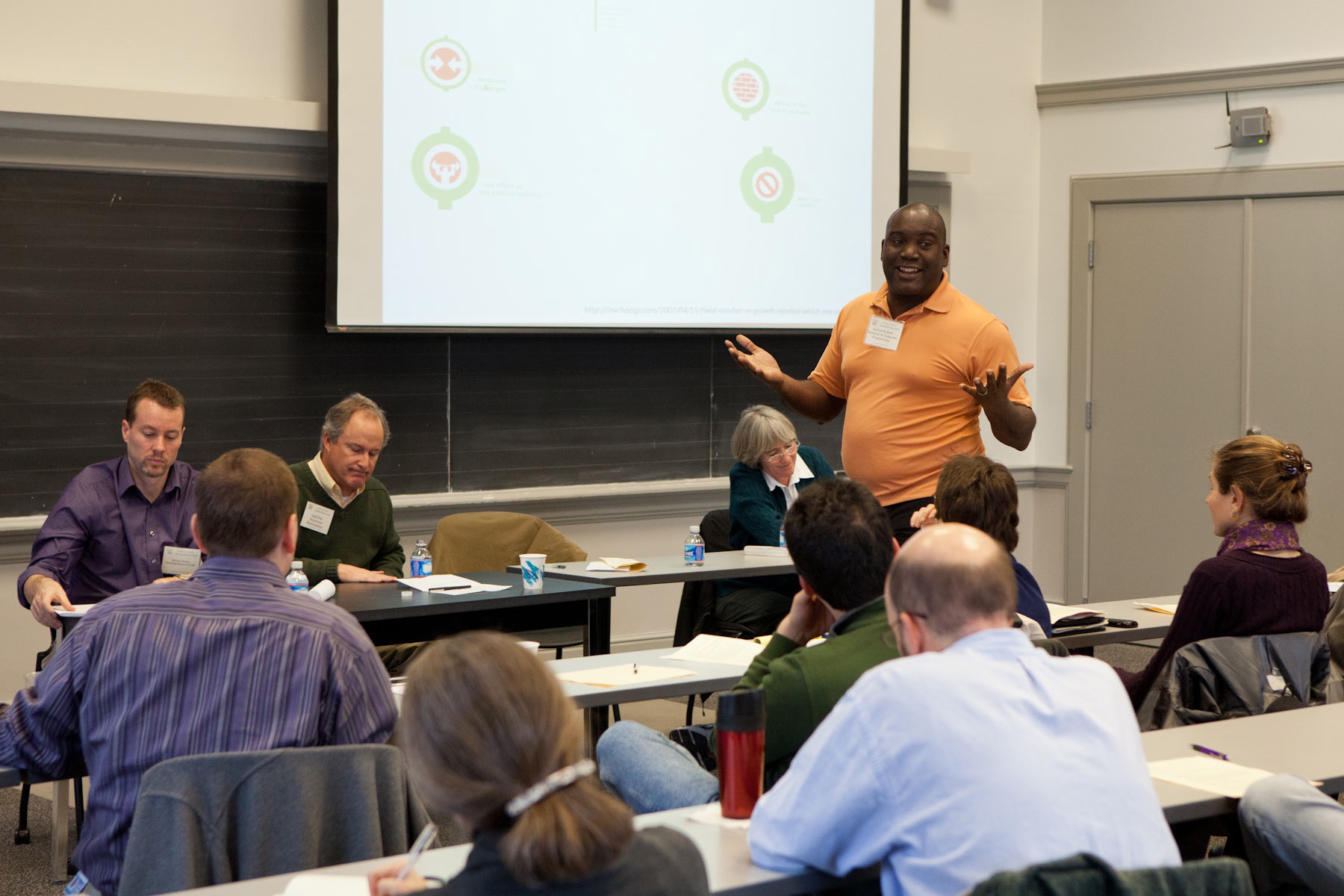"When you wouldn't rather be doing anything else." That's a sign for fourth-year University of Virginia student Grace Aheron that a course is really captivating.
Aheron and other student panelists shared their thoughts about what types of activities, class atmospheres, technologies and experiences best engage them in their courses, as part of Tuesday's January Teaching Workshop, a program of U.Va.'s Teaching Resource Center. About 130 faculty members at junior and senior levels, plus graduate teaching instructors, attended the daylong conference in Monroe Hall.
Workshop topics included furthering the educational goals of diversity; using meditative practices to boost concentration and improve academic performance; balancing concentrated reading with use of technology; improving the art of listening as a teaching tool; and avoiding "death by Powerpoint."
At a panel discussion on ideas to improve teaching of the sciences, technology, engineering and mathematics, Michael Palmer, assistant director of the Teaching Resource Center who teaches chemistry in the College of Arts & Sciences, said he believes a shift is coming in science education at the college level. Instead of drowning students in facts in huge lecture classes, courses will be geared toward better understanding the material.
"Classes will be not about content, but about understanding the content," Palmer said. For example, students would watch superior lecturers online outside of class, while class time would focus on what has traditionally been homework, such as solving problems.
Another panelist, Deborah Roach, an associate professor of biology in the College of Arts & Sciences, said she foresees, instead of separate disciplines like biology and chemistry, having topics that incorporate interdisciplinary perspectives.
Palmer and Roach took part in one of seven panel discussions focused on issues in teaching and exploring innovative teaching methods.
Another panelist, Archie Holmes, a professor in the Department of Electrical and Computer Engineering, referred to an idea about intelligence developed by Stanford University psychologist Carol Dweck, describing "fixed and growth mindsets."
"Students think intelligence is a fixed trait," Holmes said, while faculty have learned that intelligence can be developed.
Palmer countered that faculty can also unknowingly have a fixed mindset, which can lead people to give up too easily when they are intellectually challenged, or even to avoid challenges because they don't see the purpose in putting forth more effort.
Conversely, in a growth mindset, people believe their hard work will improve learning, and that leads to more successful learning.
Holmes said one way he shows students that the effort is worthwhile is having them come up with a difficult problem for him to solve in front of them in class. They'll watch him try different equations and cross things out and start again as he works on the solution.
"I personally believe students benefit greatly if they see us struggle," he said. "They see that it's OK for them to struggle."
In another panel on "Close Reading in a Digital Age," Stephen Arata, associate professor of English in the College, talked about one of the things he teaches – how to analyze rhyme and meter in poetry – with which students often struggle. His colleague, Herbert "Chip" Tucker, has devised an online learning tool, "for better/for verse," that promotes close reading of poems.
"It makes you move through the poem very slowly and focus on what's in front of you," Arata said. "Students have said it's less daunting and more enjoyable. ... It reveals to students that poems are 'made' – they're intentional."
Arata said along with the need to teach students the importance of close reading, there is a place for learning how to skim texts and read quickly, which the Internet probably reinforces. It's not an "either/or" situation, he said. It's "and/and."
Robyn Kondrad, a psychology graduate instructor on the panel, discussed how she has included the Internet as a tool for teaching students how to pay close attention to what they're reading or viewing while in class and doing research.
When teaching cognitive development in children, Kondrad was covering how children learn about lying. For part of an assignment, she had her students search online for a YouTube video clip they thought was the best example showing a child caught in a lie.
In the session, Kondrad showed a video clip of a young child trying to lie. She had white cream all over her face, but when her mother asked her repeatedly if she had put it on, the child said, "no." Then her mother asked, "What's on your hands?" to which the child replied, "Cream!"
Kondrad then has each student write a report analyzing how the video demonstrates the child's cognitive stage. Because the students had to view several, maybe dozens of videos during their search, they were practicing observational skills important in psychology, she said.
The students moved on to a second part of the assignment, working in groups and doing more research that required more focused reading. Their second reports were more sophisticated and demonstrated how much more they had learned, she said.
Teaching students how to practice close reading was one of the common themes that emerged in the daylong workshop, along with showing passion as well as expertise for one's subject matter; having the confidence to admit what you don't know to students; connecting subject material and student work to real life; and using methods and ideas that motivate students and foster "deep learning" – learning that will last a lifetime.
Media Contact
Article Information
January 19, 2012
/content/faculty-explore-innovative-teaching-methods-engaging-students-and-promoting-lifelong

